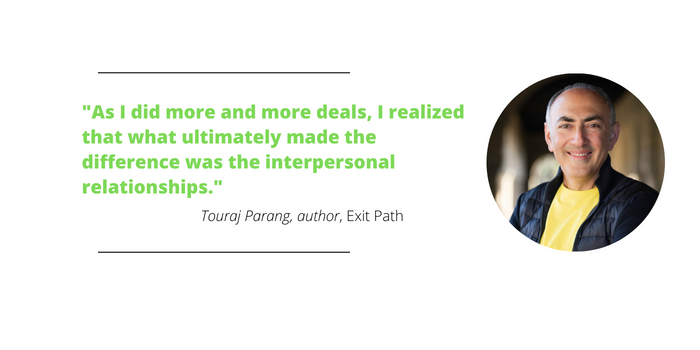Cashing Out: Should Company Founders Have An ‘Exit Path?’

The path of any company, including promotional products suppliers and distributorships, can be traced back to its early days. Whether the business has been family-owned through multiple generations or the initial founder has maintained watchful decision-making for years, there can be a lot of pride in running a company. And while that should be celebrated, a symptom of that pride can be that the notion that selling a company is taboo.
Touraj Parang has started and sold many companies, especially in the Silicon Valley sphere. In his newly released book, Exit Path: How To Win the Startup End Game, Parang tries to instill in readers that there is an achievable end game, and the best possible outcomes involve preparing early.
Amid several years of heavy merger and acquisition activity in the promotional products industry, Parang talked with PPAI Media about how owners can prepare for a potential sale down the road, knowing the right time, and the misconceptions of what it means to cash out.
PPAI Media: Should founders have the potential goal of a sale in mind when they start their companies? If not, at what point should they at least start to factor in the possibility into some decisions?
Parang: The sooner founders create an exit strategy and take steps to implement, the higher will be their chances of a successful outcome if they ever need to sell their business.
As entrepreneurs we are typically so busy with putting out one fire after another that we often end up prioritizing what is urgent over what is important. And before we know it, we lose touch with what we intended to accomplish in the first place. That is why it is critical to clarify our goals upfront and define what success would ultimately look like. For many, success is more than just attaining a certain valuation or financial outcome but also about making progress towards the achievement of a core mission.
I have seen the benefits of the simple act of creating a wish list of acquirers and examining how one would prioritize them can set in motion a course of events that can radically transform the ultimate fate of a startup. So, my advice to even budding entrepreneurs is to start with the end in mind.
PPAI Media: Business in any industry is naturally competitive. Do you think some smaller companies can make the mistake of resisting being acquired by a larger company because they are too focused with competing with them?
Parang: Yes, there is a danger that, in our paranoia about competition, we lose sight of what is truly important, which is building mutually advantageous strategic relationships, finding allies on our mission that can help us, and being a part of an ecosystem in our industry.
We made that mistake with my first startup and suffered the consequence, which was when we could no longer raise venture capital funding, we were unable to find a suitable acquirer that would properly value what we had built.

PPAI Media: On the flip side, should growing companies be careful not to sell early when they will be worth much more later?
Parang: The decision whether to sell a startup is not just about valuation, but about a number of other factors, including whether an entrepreneur believes they can best achieve their mission alone or in combination with another entity, perhaps with deeper pockets or better distribution channels.
For many entrepreneurs, it is also about creating opportunities for their team. I explore the pros and cons in considering a sale in my book Exit Path.
PPAI Media: Is there a perfect time to make a sale?
Parang: Yes, there is. And that is when the following three conditions converge: You have a willing seller, a willing buyer and a set of terms they both agree on.
PPAI Media: What should a company do to prepare for that moment or increase the likelihood of a lucrative sale?
Parang: First and foremost, start early. Create the first draft of your exit strategy. Then implement it over time by building the requisite relationships, capabilities and leverage over time, a process I call the "long game" of exit strategy execution in my book. This all can take several years.
PPAI Media: Do you believe there is a misconception that selling a company equates to retiring or even giving up on what you built?
Parang: Yes, I call this the missionary fallacy, which makes the topic of exit planning a taboo. Many missionary entrepreneurs worry that selling their startup would mean that they have given up on their mission. But that line of thinking ignores the reality of dismal startup survival rates. In fact, because most startups fail and that there are 30 acquisitions for every IPO each year, sale to a strategic partner is the most likely viable means of continuing to execute on a startup’s true mission and aspirations.
PPAI Media: Is there anything that I haven’t asked that you think would be helpful for our members, especially mid-sized companies who have spent many years in the industry and are inexperienced in what goes into a company acquisition?
Parang: I like to underscore the importance of prioritizing relationships. In today’s hypercompetitive and interconnected world, interpersonal relationships provide us with unfair advantages in business and elsewhere. What has been surprising for me is discovering the extent to which high stakes strategic partnerships and acquisitions are influenced by interpersonal dynamics, as I detail in Exit Path.
When I started out my career as a lawyer, I thought words were all that mattered. When I transitioned to venture capital, numbers became my priority. But as I did more and more deals, I realized that what ultimately made the difference was the interpersonal relationships. Genuine personal connections bring about trust, confidence, and credibility, which are the ingredients of a lasting business relationship.
For instance, in the majority of acquisitions and strategic partnerships that I have been involved with, the parties have had at least 1 year of prior familiarity with one another before signing on the dotted line.
So start early and invest time and effort in building those critical relationships.

